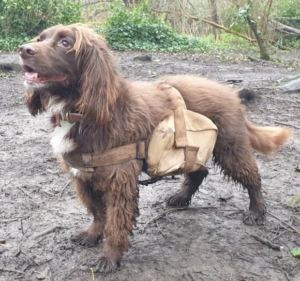
‘Man’s best friend’ helps out in a novel rewilding project
Equipped with backpacks full of wildflower seeds, dogs in a scheme in England are mimicking an ecological role left vacant by wolves. They are being enlisted to “act like wolves” to help rewild an urban nature reserve in the East Sussex town of Lewes.
Before wolves were persecuted to extinction in the UK circa 1760, they were known to roam large areas, typically covering 12 miles (20km) or more each night. In doing so, wolves would inadvertently pick up wildflower and grass seeds in their fur, dispersing them many miles away and helping establish new colonies of plants - vital for biodiversity and for ecosystems to thrive.
The initiative is being run by the Railway Land Wildlife Trust (funded by Ouse Valley Climate Action) and the Wilderlife rewilding platform – it’s thought to be the first of its kind in the UK.
‘This has been such a joyous experience,’ said project manager Dylan Walker, ecologist. ‘Dog walkers often get bad press when walking in the countryside, so we’re so pleased to tell a story in which dogs and their owners are the stars.
‘It’s been a huge success in terms of engaging with the local community, including people who might walk through the reserve, but aren’t necessarily knowledgeable about nature. And, of course, there’s the seed germination, too…’
The project was inspired by a similar initiative in Chile in 2019. A couple of sisters lived in an area where a huge forest fire destroyed most of the trees and the understory flora. They had the idea to put packs on their labradors and let them run through the forest reseeding tree species.
The seed mix being used on the East Sussex patch features 23 perennial wildflowers, including Early Purple Orchid and Common Spotted Orchid, as well as the likes of bluebell, primrose and wood sage.
The project was made open to all dog walkers using the space, with Walker’s team offering initial training, after which dog walkers could pick up the packs (complete with tiny holes) from the reserve HQ.
Twelve dog walkers and their dogs took part in the project this spring and the team are intending to run it again in the autumn. The seeds were mixed with sand, which proved to be really helpful in allowing the team to track where the dogs deposited the seeds.
It is thought that dogs cover about four times more ground than their owners and behave in a way that is more helpful to nature; humans are too linear in their patterns. Now, other nature reserves also want to take part in the scheme – which is great news.
Carl Dodd, Property Revolutions Ltd.

